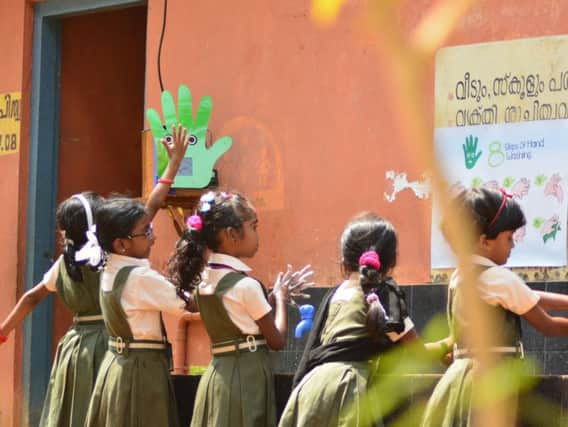Scottish robot lends a hand at Indian school


Now academics from the University of Glasgow have invented a robot which encourages school children to wash their hands - and have trialled it at a remote primary school in India.
The hand-shaped robot, called ‘Pepe’, is the product of a collaboration between researchers from the University of Glasgow in Scotland and Amrita Vishwa Vidyapeetham University in India.
Advertisement
Hide AdAdvertisement
Hide AdPepe was mounted to the wall above a handwashing station at the Wayanad Government Primary School in Kerala, which has around 100 pupils aged between five and 10.
A small video screen mounted behind Pepe’s green plastic exterior acted as a ‘mouth’, allowing researchers to tele-operate the robot to speak to the pupils and draw their attention to a poster outlining the steps of effective handwashing. A set of moving ‘eyes’ helped bolster the illusion that Pepe was paying attention to the childrens’ actions.
The robot helped pupils to wash their hands more effectively and more consistently, boosting their rates of handwashing by 40 per cent. Pupils spent on average twice as long washing their hands after Pepe’s arrival.
After the intervention, more than 95 per cent of the students could correctly determine when handwashing with soap has to be done - before a meal and after a visit to the toilet.
Hand-washing is one of the most effective defences against the spread of diarrhoea and respiratory infections, which cause the deaths of around 1,300 young children each day around the world – 320 of which are in India alone, according to figures from WaterAid India and the World Health Organisation.
Dr Amol Deshmukh, from the University of Glasgow’s School of Computing Science, led the project in partnership with colleagues from Amrita University.
Dr Deshmukh said: “We chose this particular primary school for our research because the pupils are drawn from scheduled castes and tribes, a segment of the Indian population which is most affected by poor sanitation and hygiene. We believe this is the first social robotics study to try to improve the lives of children like this.
“None of the children had ever interacted with anything like a robot before, but they were excited to interact with this relatively simple machine, which clearly had a positive effect on their efforts to keep their hands clean.”
Advertisement
Hide AdAdvertisement
Hide AdHe added: “Social robots could potentially create a positive impact in their lives, but they have rarely been tested with people from rural backgrounds in developing countries. This research helps in identifying a valuable and viable use case for social robots in rural populations in developing countries.”
The project is the second ‘social robot’ research project conducted by the University of Glasgow and Amrita University. Last year, they introduced a four wheeled robot to help residents of Ayyampathy in southern India carry 20-litre bottles of water from the local well to their homes.